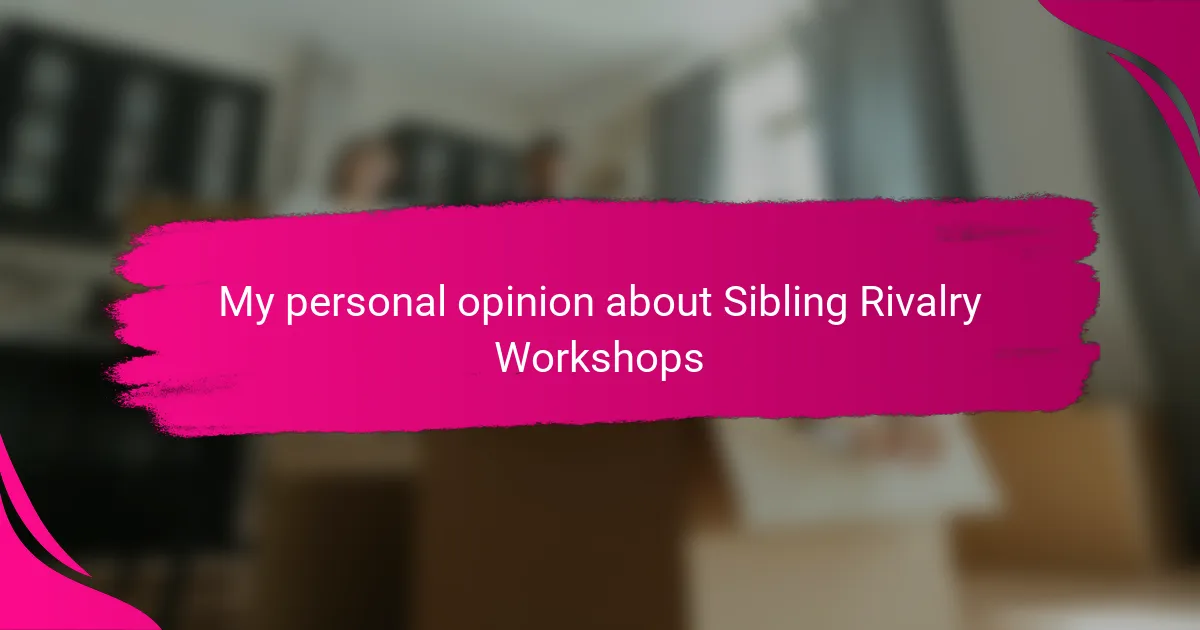Key takeaways
- Sibling rivalry often stems from unspoken emotions like the need for attention or connection.
- Workshops enhance communication skills among siblings and parents, helping to transform rivalry into cooperation.
- Key strategies include teaching children to express feelings without blame and involving them in creating family rules.
- Regular family meetings and joint tasks strengthen bonds and foster conflict resolution skills among siblings.
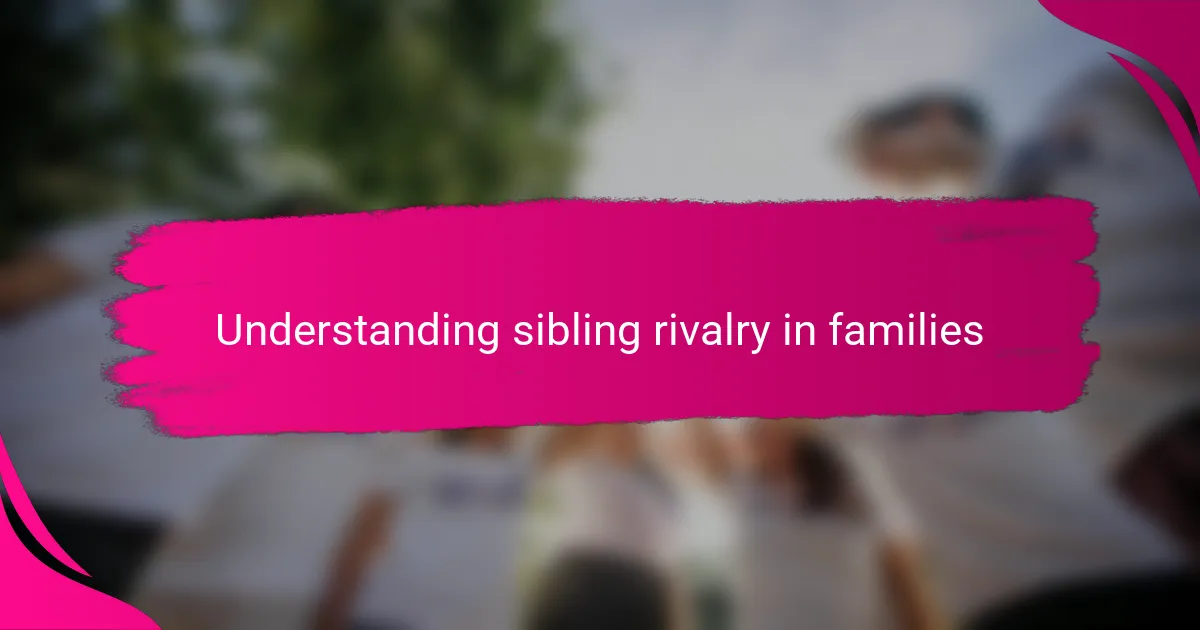
Understanding sibling rivalry in families
Sibling rivalry often feels like a natural part of family life, yet it can stir up surprisingly intense emotions. I’ve watched how small disagreements between siblings can quickly escalate, leaving parents feeling helpless. Have you ever wondered why these conflicts sometimes seem deeper than mere jealousy or competition?
From my experience, understanding the underlying causes—like the need for attention or the struggle for identity—really changes how we see these interactions. It’s less about labeling kids as “troublesome” and more about recognizing their unspoken feelings. When I started viewing rivalry through this empathetic lens, I noticed a shift—not just in my approach but in the way my children related to one another.
Sometimes, what looks like rivalry is just a call for connection disguised as conflict. Can we, as parents, listen beyond the noise and truly grasp what our children are trying to express? It’s a challenging question, but one worth asking if we want to nurture stronger family bonds.

Benefits of sibling rivalry workshops
Sibling rivalry workshops have been a game changer in my parenting journey. They offer practical tools that help siblings communicate better, transforming rivalry into cooperation. When I applied some of these techniques, I saw my kids argue less and actually start to team up during tough moments.
What really stood out to me is how these workshops make everyone feel heard. They teach parents and children alike to recognize emotions behind the bickering. Have you ever noticed how much calmer a conflict becomes when each child knows their feelings are understood? That alone can shift the entire family dynamic.
Another benefit I appreciate is the emphasis on building empathy. These sessions encourage kids to see things from their sibling’s perspective, a skill that doesn’t come naturally to all of us. It’s incredible to watch moments of genuine connection emerge after years of rivalry—proof that change is possible when we invest in understanding.
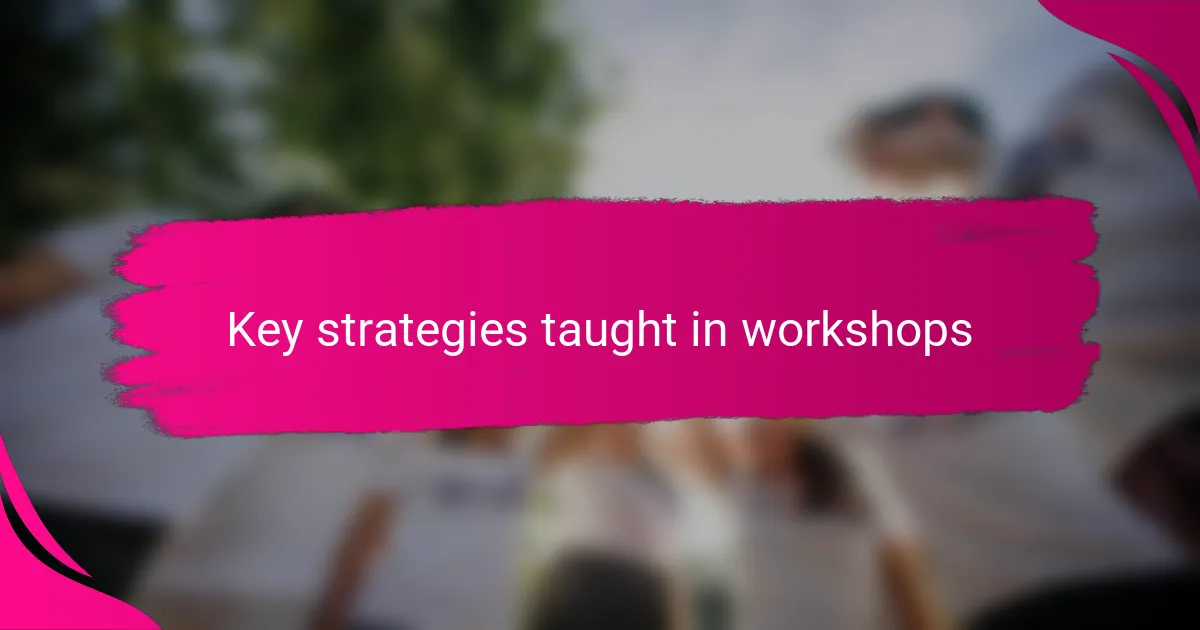
Key strategies taught in workshops
One strategy I found particularly powerful in these workshops is teaching siblings how to express their feelings without blame. Instead of saying, “You always take my things,” the kids learn to say, “I feel upset when my things are borrowed without asking.” This simple shift in language surprised me—it instantly softened the mood and opened the door for real conversation.
Another approach that resonated with me involves setting clear, fair family rules that everyone helps create. When siblings participate in making agreements, like sharing spaces or taking turns, I noticed they take ownership and respect those boundaries more. Have you ever tried letting your kids draft their own “peace rules”? It’s amazing how invested they become in keeping the harmony.
Perhaps the most eye-opening strategy is encouraging parents to step back and become mediators rather than referees. I used to jump in to solve fights immediately, but learning to guide conversations instead of dictating outcomes changed the dynamic entirely. When children work through conflicts themselves—with gentle parental support—they develop skills that last far beyond childhood.
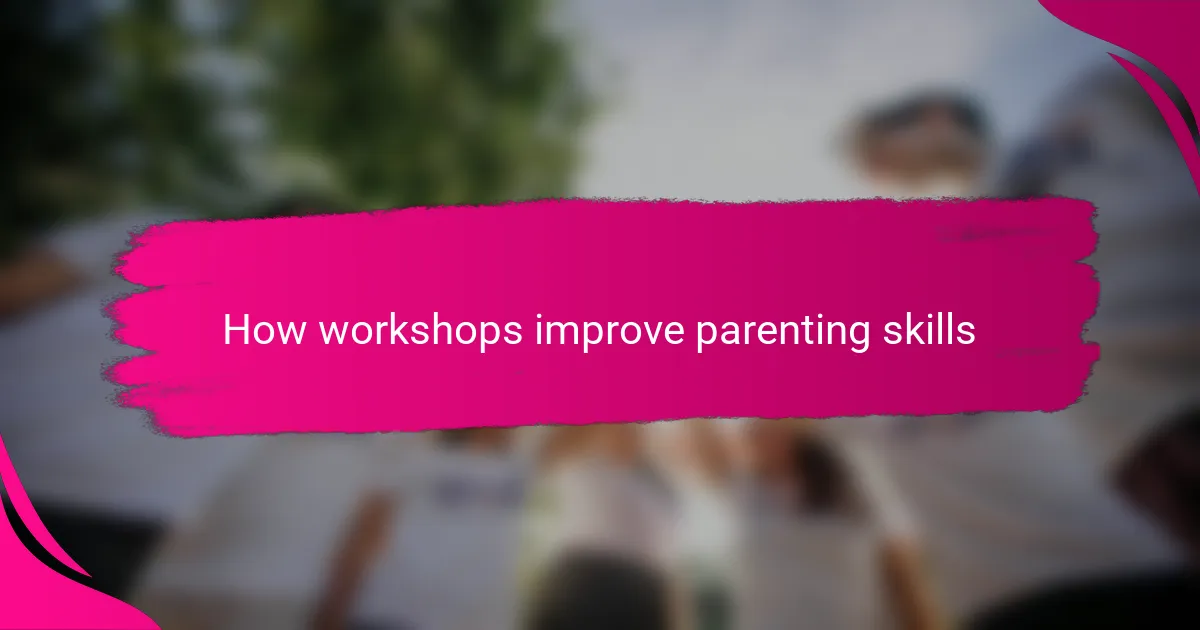
How workshops improve parenting skills
Workshops have a way of turning theory into practice, which I find invaluable. When I attended one, I realized how much my parenting instincts needed refining—learning concrete communication techniques helped me respond thoughtfully rather than react out of frustration. Have you ever noticed how a well-timed question or phrase can defuse tension instantly? That’s the kind of skill these workshops nurture.
What really impressed me is how workshops boost confidence in handling sibling disputes. Instead of feeling overwhelmed, I started seeing these moments as opportunities to teach empathy and problem-solving. This shift in mindset transformed my daily routine and made parenting feel less like a battle and more like a shared journey.
Moreover, I came to appreciate how workshops emphasize listening—not just hearing words, but truly understanding emotions underneath. That deeper awareness changed the conversations I had with my children, making them feel safer and more valued. Have you ever experienced that breakthrough moment when a child opens up because you finally “get” them? Those moments are priceless, and workshops guide us right there.

Personal experiences with these workshops
I remember the first time I attended a sibling rivalry workshop, feeling both hopeful and skeptical. During one exercise, we role-played conflicts, and seeing my children express their frustrations out loud—without the usual shouting—hit me hard. It made me realize how much I had underestimated their need to be heard.
One particular session stood out when we practiced active listening, and I noticed my kids nodding along as their sibling shared feelings. Have you ever witnessed that moment when the walls of defense suddenly crumble? It was powerful, and I felt a quiet pride watching them connect in a way they never had before.
Of course, not every workshop felt like an instant fix. There were times I left feeling overwhelmed by all the new ideas. But reflecting back, those moments pushed me to be more patient and creative. Isn’t growth often uncomfortable yet rewarding? For me, these workshops are less about quick solutions and more about building lasting understanding.
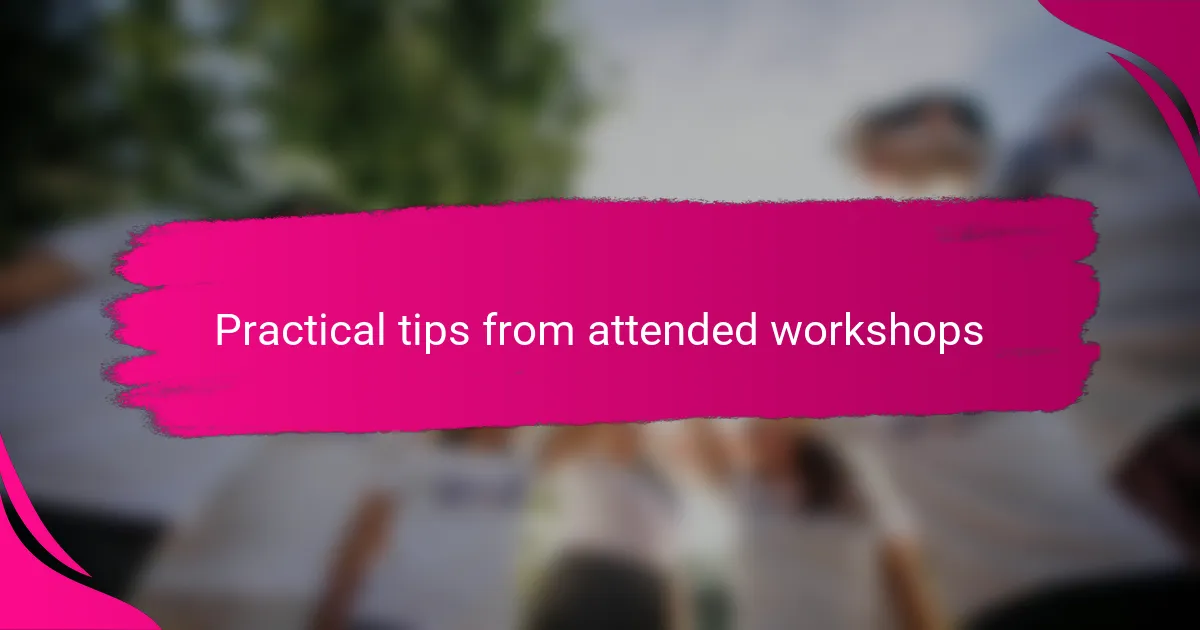
Practical tips from attended workshops
One practical tip that stuck with me is the importance of setting aside regular “family meetings.” These small gatherings became a safe space for my kids to air grievances and celebrate wins, and surprisingly, it cut down on daily squabbles. Have you ever tried dedicating just 10 minutes a week to just listening? It really shifts the household vibe toward cooperation.
Another nugget I took away was encouraging siblings to team up on small tasks or challenges. I started suggesting simple joint projects like organizing a bookshelf or planning a snack, and I could see their bond strengthen in these shared moments. It made me wonder—how often do we miss opportunities for connection because we focus solely on conflict?
Finally, I learned that parents playing referee only works for so long; instead, guiding kids to develop their own conflict resolutions empowers them tremendously. I recall a time when my kids came to me after a disagreement, worked out their issues, and felt proud of themselves. Witnessing that growth made me realize just how valuable these workshops can be in reshaping family dynamics.
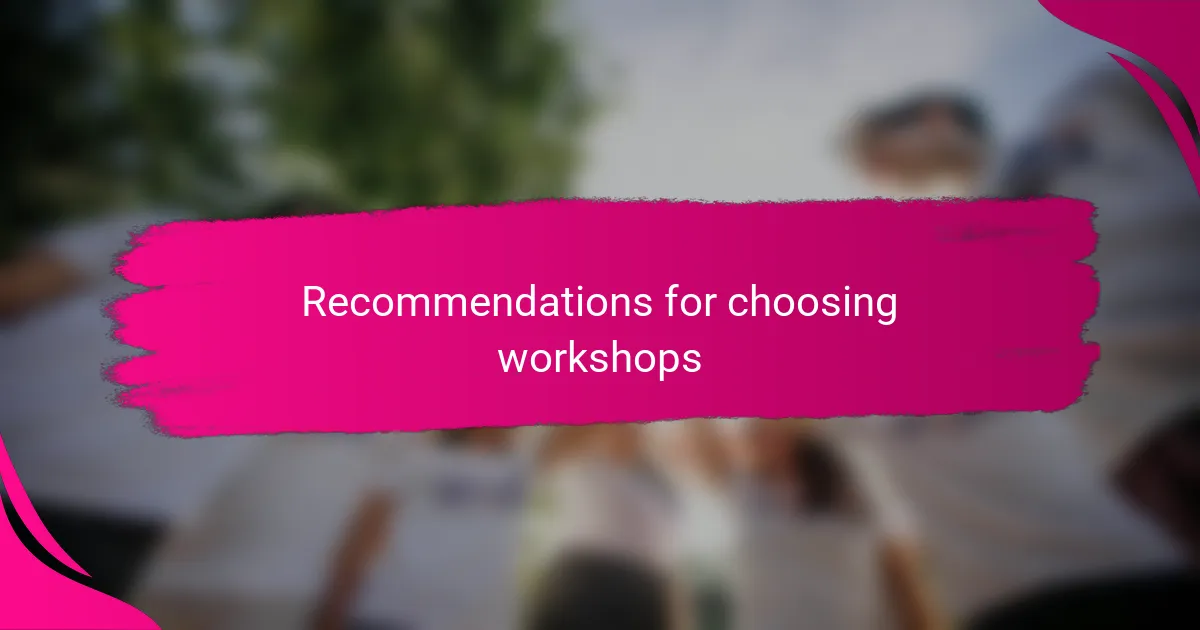
Recommendations for choosing workshops
Choosing the right sibling rivalry workshop isn’t always straightforward, and I’ve learned that it pays to dig a little deeper than just the catchy titles. I usually look for workshops led by facilitators who combine professional knowledge with real parenting experience—that mix makes a big difference. Have you ever attended a session where the leader seems disconnected from everyday family life? It can leave you feeling more confused than empowered.
Another tip I found useful is checking how interactive the workshop is. From my experience, passive listening doesn’t cut it when dealing with sibling dynamics; you want something that encourages participation, role-playing, or real-time problem solving. Why? Because those hands-on moments stick with you longer and change the way you handle conflicts at home. I remember one workshop where practicing communication techniques with my kids side-by-side made the learning immediate and memorable.
Lastly, consider the workshop’s focus and whether it aligns with your family’s unique challenges. Some are geared toward younger children, others work better with teens, and topics can range from conflict resolution to building empathy. I once joined a session that felt too generic for my situation, so I switched to one that offered tailored strategies—and that shift boosted our progress tremendously. Have you noticed how a little customization can make all the difference in applying new skills effectively?
